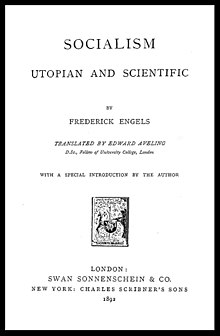Socialism: Utopian and Scientific
Socialism: Utopian and Scientific is a short work first published in 1880 by Friedrich Engels. The work was intended as a way to make the ideas of Anti-Dühring, a longer polemic work published in 1876, more accessible, and is largely extracted from three chapters of such. It first appeared in French.
The book goes over the development of pre-Marxist socialist thought, then dialectics, and finally historical materialism, which is considered to be the application of Marxist thought to the evolution of human society. The differences between utopian socialism and scientific socialism, the latter represented in Marxism, are explained. Utopian socialism is characterized as idealist, meaning it is based on the opinions or theories of individuals. Scientific socialism, on the other hand, derives itself from physical reality and the abstract relations arising from it, focusing on the materialist conception of history. The book concludes that communism naturally follows capitalism.
Summary
Chapter 1: The Development of Utopian Socialism
Engels begins the book by providing a brief history of socialist thought beginning from the modern era, noting that the rationalist, democratic, and communist movements of this period are the first expressions of the class struggle that has begun to develop in capitalism. In particular, he chronicles the particular thought of the three great utopian socialists of the late 18th and early 19th centuries, who are considered to be the forefathers of scientific socialism. He starts with Saint-Simon, then proceeds to Charles Fourier and Robert Owen. For each he demonstrates the fatal flaws and limitations of their ideal social systems, but notes their historical context, wherein class struggle was only beginning to emerge. This is exemplified by the utopian socialists' favoring of the broad masses as opposed to the working class. Thus Engels has a mixed, though somewhat favorable view of these philosophers for their contributions, which both he and Marx would develop on. If anything, he writes that the only people to be condemned in this discussion are the ones who refuse to take the ideas of the utopian socialists in context, who haughtily consider themselves smarter for knowing better than the utopians; not realizing that they have immense hindsight over those philosophers.
Chapter 2: Dialectics
Engels writes how Hegel was a culmination of the history of philosophy up until then, drawing influence from Ancient Greek dialectics and metaphysics, the former of which was rather primitive compared to Hegel's own. Engels notes that metaphysicians made several mistakes, such as not recognizing the importance of contradictions in logic. He explains that “the two poles of antithesis are as inseparable as they are opposed”, writing that nature is proof of this. Engels praises Hegel for his dialectical method, which finally realized the criticality of the antithesis, and that by this "Hegel has freed history from metaphysics". However, Engels also points out Hegel's own mistakes; that he was idealistic, and had limited knowledge because of how comparatively primitive he is in regards to the time of Engels. He finishes by saying that with Marx's application of materialism, Hegelian dialectics is further refined, finishing with an explanation of capitalist exploitation and explaining that Marx has made socialism into a science, and that "[t]he next thing was to work out all its details and relations".
Chapter 3: Historical Materialism
Engels begins this chapter by explaining that the material reality of the economy is the most important factor in determining society, rather than "free-floating" ideas — this concept is the essence of historical materialism. He writes on how capitalism came to be, explaining the transition from feudalism to capitalism and how the modern bourgeoisie was established. He explains how the means of production and the division of labor developed, and how this organized labor in a brand new form of organization: the factory system. Whereas in feudalism goods largely belonged to the people who made them, as there was only person who was generally responsible for their production, factories involve the specialized labor of several workers and thus there is no clear basis of ownership for the products; and because the expensive machinery can only really be bought by a capitalist, the workers are left with no means of production themselves and must instead find work on the terms of the capitalist, who gives the workers merely what they need for subsistence and keeps the rest (the surplus) to oneself. Thus, the pre-existing relation of private property generates the exploitation of the workers. Engels continues in saying that capitalism has a natural tendency to overproduce, which is one of its core weaknesses, and that one of a state's main functions is to defend the institution of private property. Under socialism, he writes, the state will slowly wither away as such monopolization of force will become untenable.
The State is not "abolished". It dies out.
He ends by recapitulating the history of societies, from medieval to the future proletarian one, and applies the Marxist use of Hegelian dialectics as well as historical materialism to each of them; medieval feudalism, to start, primitively contains many of the forces that would become actuated in capitalism, such as commodity production, which given the comparatively low productive forces of feudalism were rather slim. As capitalism developed from feudalism and these forces matured, there also formed several antagonisms, contradictions; that of the proletariat against the bourgeoisie, that of the organization of individual factories against the anarchic forces of capitalism, and that of the capitalist tendency to overproduce and the need to circulate capital (through M-C-M') so as to generate a profit, which is hampered by the fact that workers become unemployed and cannot afford those commodities. The proletarian revolution resolves these contradictions, transforming private property into public, thus abolishing the antagonisms generated by such and leading to a breakdown of the class system.
